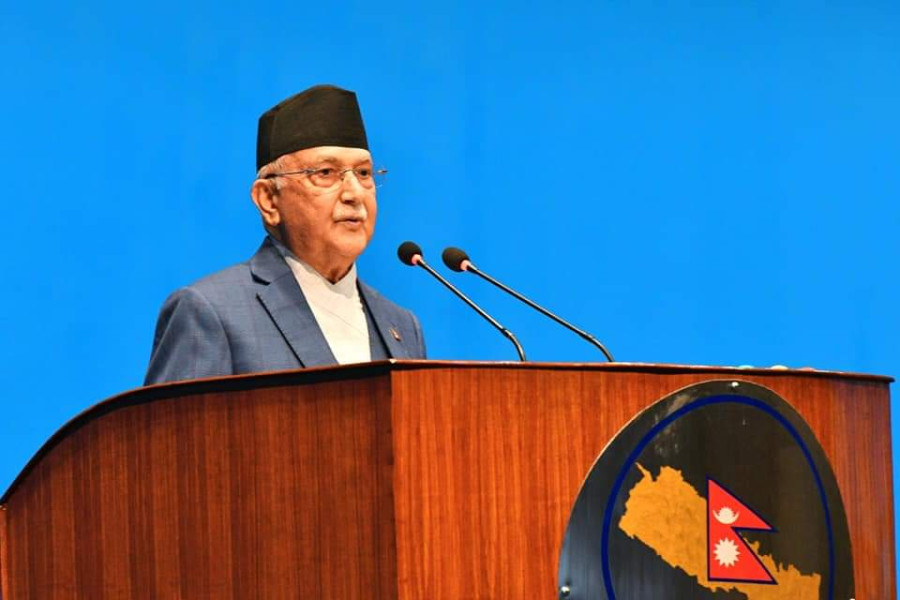National
Nepal will settle Kalapani through diplomacy: PM
Says the country’s claim will rely on Sugauli Treaty, various maps and historical facts and evidence.
Post Report
Prime Minister KP Sharma said that the Nepal government is committed to resolving boundary issues through diplomacy.
The prime minister also defended the July 1 seven-point agreement signed between his party CPN-UML and the Nepali Congress.
Responding to lawmakers’ questions in the House of Representatives on Monday, for the first time after becoming the prime minister last Sunday, the prime minister clarified that the boundary dispute with India will be resolved through talks and diplomatic channels, on the basis of the Treaty of Sugauli, various maps, and historical facts and evidence. This has been a consistent commitment of the government of Nepal, he added.
Nepal and India have a boundary dispute in Kalapani and Susta regions. The situation escalated in 2020 when the Oli government unveiled a new administrative and political map of Nepal in response to India’s unilateral incorporation of Kalapani, Lipulekh, and Limpiyadhura into its territory with a new map in November 2019.
Since then, both sides have been waiting for the formal announcement of boundary talks, but no concrete steps have been taken.
The prime minister said there was an understanding during the high-level visits and talks between the prime ministers of Nepal and India to resolve boundary issues through established mechanisms. In 2014, Nepal and India had announced a foreign secretary-level mechanism to look into boundary matters, including Susta and Kalapani. However, not a single meeting of the mechanism has been held in the last decade.
Nepal has repeatedly requested that India convene the meetings of these mechanisms so that the boundary dispute can be amicably resolved.
“During the seventh Nepal-India foreign minister-level meeting in Kathmandu on January 4, 2024, boundary-related matters were discussed, and commitments were made to conclude boundary work in the remaining sections of the Nepal-India border. And through the Nepal-India boundary working group, the construction, restoration and maintenance of border pillars and markers, as well as technical tasks like collecting details of no man’s land and cross-holding of properties have been carried out and are ongoing,” said the prime minister.
However, the meeting of the boundary working group has been stalled after Covid pandemic outbreak in early 2020.
The Boundary Working Group (BWG) established in 2014 handles the technical tasks related to Nepal-India boundary. It has already mobilised joint teams to work on the construction, repair and restoration of boundary pillars, preparation of inventory of encroachment of the no man’s land and cross border occupation, and conducting GPS observations of boundary pillars.
Oli said that Parliament, Nepal government, and Nepali people clearly understand Nepal’s international border and there is also an unprecedented national consensus among parties on border and boundary issues.
The government of Nepal firmly believes that the eastern part of the Kali (Mahakai) River, including Limpiyadhura, Kalapani, and Lipulekh, belong to Nepal as per the 1816 Treaty of Sugauli.
Responding to a query by Rastriya Prajatantra Party lawmaker Deepak Bahadur Singh, the prime minister said efforts are underway to schedule boundary mechanism meetings at a mutually convenient date.
Similarly, the prime minister also stated that a company of the Armed Police Force has been set up in Chhangru of Darchula and five border outposts have been added on the Indian side and one on the Chinese side.
Defending the seven-point agreement with the Nepali Congress on July 1, the prime minister said political leaders do not have a fixed timetable for reaching agreements.
“Political parties do not have fixed office time,” he said, responding to the queries of lawmaker Durga Rai. She had questioned why the Congress and the UML had to reach an agreement at midnight and could not wait for 12 more hours.
“Is there any hard and fast rule that you have to arrive at an agreement at a specific time?” the prime minister said.
He also stated that corruption control is his government's priority and that the government will take all possible measures.
“In the interest of the Nepali people, the government is committed to protecting national interests, controlling corruption, and investigating cases of gold smuggling, cooperatives fraud, and the fake Bhutanese refugee scam, among others. I assure you that all culprits, big or small, will be brought to justice,” said Oli.
The prime minister also stated that his government will take all necessary measures against exorbitant lending practices, cooperatives fraud, irregularities in microfinance institutions, and the Hundi (remit) business. He vowed to uphold justice with thorough investigations and accountability for those involved in such illegal practices. He also announced plans to review and amend the Public Procurement Act and related laws to ensure their effective implementation in line with current needs.
He said the Gandaki Economic Triangular Project comprising the Bharatpur-Butwal-Pokhara-Muglin-Bharatpur route, as announced in the budget speech, aims to promote integrated development. The project is expected to contribute to the development of industrial, energy, agricultural and tourism sectors, he added. He said the bodies concerned had been directed to complete the construction of the Siddhababa Tunnel Way.
The prime minister updated the House on the Millennium Challenge Nepal Corporation Compact during the question-answer session, stating that work had been expedited for the construction of a transmission line, substation and road gradation in line with the compact.
There has been an agreement for the construction of a substation, awarding the tender for the construction of a portion of the transmission line is in final stages, and the remaining work is in progress.
“A financial implementation plan of the MCC to use the $500 million from the US government will come into operation. This project will contribute to Nepal’s energy sector, and new technology will be transferred for road upgrade,” said Oli.




 18.12°C Kathmandu
18.12°C Kathmandu













